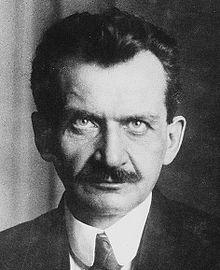Otto Wels
| Otto Wels | |
|---|---|
 |
|
| Chairman of the Social Democratic Party of Germany |
|
|
In office 14 June 1919 – 16 September 1939 |
|
| Preceded by |
Friedrich Ebert Philipp Scheidemann |
| Succeeded by | Hans Vogel |
| Executive representative of the Labour and Socialist International |
|
|
In office 1923–1938 |
|
| Personal details | |
| Born | 15 September 1873 Berlin, German Empire |
| Died | 16 September 1939 (aged 66) Paris, French Third Republic |
| Political party | Social Democratic Party of Germany |
| Occupation | Politician |
Otto Wels (15 September 1873 – 16 September 1939) was the chairman of the Social Democratic Party of Germany (SPD) from 1919 and a member of parliament from 1920 to 1933.
Born in Berlin, the son of an inn-keeper, Wels in 1891 began an apprenticeship as a paper hanger and joined the SPD. From 1895 to 1897 he served in the German Army. From 1906 he worked as a trade union official, party secretary in the Province of Brandenburg and the Vorwärts press committee. In 1912 he was elected to the Reichstag and with the support of August Bebel joined the SPD executive committee the next year.
In the German Revolution of 9 November 1918, Wels was a member of the Berlin Workers' council (Arbeiter- und Soldatenrat) of the SPD and USPD. He was appointed military commander of the city and consequently had to deal with the occupation of the Stadtschloss by revolutionary forces including violent fights with Freikorps units. Upon the election of Friedrich Ebert as Reich President on 11 February 1919 he acted as presiding officer of the SPD and was formally elected chairman together with Hermann Müller on June 14.
In 1920 Wels and Carl Legien organised the general strike that helped defeat the right-wing Kapp Putsch, after which Wels enforced the resignation of his party colleague Gustav Noske as Reich Minister of Defence. He argued for the foundation of the Reichsbanner Schwarz-Rot-Gold and the Iron Front paramilitary organisations against the rising extremist forces of the SA, Stahlhelm and Rotfrontkämpferbund. From 1923 Wels also became a member of the executive of the Labour and Socialist International. After the 1930 Reichstag election, Wels advocated the toleration of the cabinet of Chancellor Heinrich Brüning, who had lost the support of the DNVP deputies. Even after the Preußenschlag of July 1932 against Otto Braun's government in the Free State of Prussia, he spoke against a general strike; however after the Reichstag election of November 1932 he rejected any negotiations with the new Chancellor Kurt von Schleicher.
...
Wikipedia
